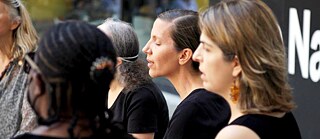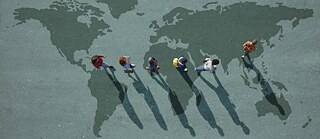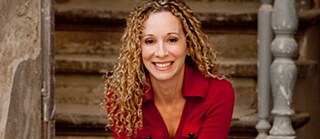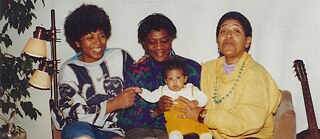Über den Verlust
Grief
Trauer über den Verlust eines geliebten Menschen ist ein besonders schmerzlicher Teil des Lebens. Aber was genau ist Trauer eigentlich? In Zeiten des globalen Traumas von Krankheit und Tod, versucht Jocelyn Robinson Trauer als eine unserer Grunderfahrungen zu begreifen. Dafür spricht sie mit Menschen, die einen schmerzlichen Verlust erlebt haben und zeichnet die Geschichten der Trauernden auf.
Diese Folge anhören: Apple Music | Spotify | Download
Jocelyn Robinson hat in sehr persönlichen Interviews mit Menschen gesprochen, die einen schmerzlichen Verlusts erfahren haben. Jocelyn ist Pädagogin und freie Journalistin in Yellow Springs, Ohio und engagiert sich stark für den Erhalt des Radios. Mit der „Radiobrücke Rerversed“, einem Austauschprogramm des Goethe-Instituts für Radiojournalist*innen, besuchte sie 2019 den deutschen Radiosender Deutschlandfunk Kultur. Mehr über Jocelyn Robinson ist auf ihrer Webseite zu erfahren. In dieser Folge spricht sie mit einer Therapeutin, mit einem Psychologen und mit Menschen, die einen persönlichen Verlust betrauern. Die Musik zu dieser Folge ist komponiert und arrangiert von Tom Amrhein. Produktionsassistenz Juliet Fromholt und Tom Amrhein mit Unterstützung durch Seth Gordon. Das Bild zur Folge stammt von Leigh Davis aus ihrem Liederzirkel Offering, einem Projekt, das individuelle und kollektive Trauererfahrung unterstützt. Außer der Folge „Grief“ hat Jocelyn Robinson die Folgen „The Flag“ und „Home“ beigesteuert, die auch auf Deutsch zur Verfügung stehen. Zusätzlich zu dieser Folge produzierte Jocelyn Robinson die Episoden „A Singer’s Life“ und „Showing Our Colors“ für THE BIG POND.
Transkript
[CHORUS OF VOICES]
Jocelyn Robinson: Grief. Seems it’s all around us these days. Since the spring of 2020, we’ve grieved great loss of life, but we’ve also been grieving loss of livelihoods, loss of ways of life. Nothing is as it was before this collective pall descended on the planet, carried on the spike protein of a novel coronavirus. We’re grieving. All of us. As present as grief is, it’s something we often bear silently, not something we speak of, at least not readily. But I don’t think silence is serving us. I want to talk about it. I want to make its acquaintance, to get to know it better. Maybe familiarity will make it less overwhelming. So, I asked a few people, some close to me, some not so close, to speak their grief. And speak they did — of a cancer diagnosis, divorce, being shunned by family after leaving a religious community, losing a spouse, the death of a parent, which is a club we’ll all belong to, eventually. They spoke of what grief feels like. [CHORUS OF VOICES] For decades, we’ve understood grief as a process with five discernible stages. Denial, anger, bargaining, depression, and acceptance are based on observations made by Swiss-American psychiatrist Elisabeth Kübler-Ross in her 1969 book, “On Death and Dying.” Those stages were really intended to describe coming to grips with a terminal diagnosis, but they were picked up by pop psychology to offer a simplistic model for grieving that’s been applied to everything from loss of a loved one to loss of a pet. We know now that grieving isn’t a linear process, with each phase following the other in a predictable order. It’s grimly capricious. There might be many more stages, like guilt or bewilderment. We move in and out of these stages. We feel fine one day and triggered into despair the next. And grief isn’t just a feeling; grief is embodied. [CHORUS OF VOICES] Death isn’t the only cause of grief. There’s loss of a job, or a relationship, loss of health, or youth, or innocence. There are gender differences in how grief is experienced and expressed. There are cultural differences. And there are degrees of grief. As one person told me, there’s ‘Big G Grief’ and ‘Little g grief.’ As unique as each one of us is and as unique as the sources of our grief, it’s remarkable how similarly we experience it. But what is grief, exactly? And more importantly, why is grief?
Dr. Jonathan Singer: Grief is the response to losing someone or even something that has meant something to your life.
Jocelyn Robinson: That’s Dr. Jonathan Singer. He’s a clinical psychologist on the faculty at Texas Tech University. He researches grief.
Dr. Jonathan Singer: Yeah, I think of grief, like any emotion, and emotions are there to inform us of things that are good and things that are bad from a very young age, all the way up to, you know, till we die.
Jocelyn Robinson: According to Dr. Singer, for most of us, experiencing grief is a normal and unavoidable part of the human condition, so much so that it’s not even considered a mental health disorder. Most of the time, we’re resilient. We emerge from grieving, maybe worse for wear, but able to move ahead with our lives. But for some, grief is debilitating and long-lasting. That used to be called ‘complicated grief,’ but now it’s ‘Prolonged Grief Disorder’ or ‘PGD.’ It’s a brand-new diagnosable mental disorder in the DSM-5, the American Psychiatric Association’s Diagnostic and Statistical Manual of Mental Disorders, 5th Edition, Text Revision of 2022.
Dr. Jonathan Singer: Now, we’re going to have the ability to not only diagnose people but treat people more effectively. We can also, from my perspective and a research perspective, have a better understanding of what people are going through. Now, we have something we can really study and look at these risk and protective factors for much bigger populations.
Jocelyn Robinson: That research is much needed. We Americans seem to take grief pretty hard compared to the rest of the world. In countries like Japan, the Netherlands, and Germany, rates of PGD are low, less than 5%.
Dr. Jonathan Singer: But in the United States, we see all the way from about 8% up all the way to 22%. This has been a question that researchers in this area have really been trying to figure out. How come, you know, we see more people affected with Prolonged Grief Disorder than other countries? One hypothesis is just like, for example, in Japan, we might see more close-knit families, more support after the death, things like that, protective factors.
Jocelyn Robinson: ‘Protective factors.’ Like the comfort of family and friends. And therapy.
Louise Smith: My name is Louise Smith. I had been an actor and an educator — among other things — but, primarily, now I work as a therapist. I was involved with a program called Foundations of Contemplative Care at the New York Zen Center, which is about end-of-life and grief work, through the lens of Zen Buddhism. And one of the things that I found in practice was that reality that we have been in the midst of loss, in the midst of suffering, which as Americans, we tend to want to minimize or get through very quickly, and our grief, our collective grief as a country is something that I think we have to deal with. And you know, in Buddhism we talk about the ‘Great Matter,’ which is death. That is the center, you know, suffering is the center of the philosophy of Buddhism; there is suffering in the world. That’s the first great noble truth. So, we’re invited now to really come to terms with this, what we’re in right now.
Jocelyn Robinson: So, what is its function for us as humans?
Louise Smith: Were we to not feel grief, we wouldn’t have the sense of preciousness for life, the reverence for what it means to be alive. And that reverence is what is our compass point, I think, that keeps us in our humanity in a way. So, I think it serves a very profound purpose, and that’s one of the things that gets kind of lost. Like, oh, I should be over this by now. So yeah, grieving is, it takes a lot of different forms and when it’s unacknowledged, it can look like other things. Depression, anger, even, you know, I think in men, it can come out as anger a lot. You know, there’s much to learn there, and then, there is much forging of character and forging of humanity in the process of grieving. It’s one of the most profound and beautiful things we do as humans. The purpose is to bring us into our full humanity, to allow ourselves to be in the face of death and knowing it, and in that process, be really alive to each other, to ourselves.
Jocelyn Robinson: I asked people to share this profound and beautiful process with me. People like Abbey Pettiford. She’s married to my nephew Anthony. And the unthinkable happened to this young couple.
Abbey Pettiford: I was 39 weeks pregnant, and I went into labor, and when I got to the hospital, there was no heartbeat. The day before I was at the doctor, and my baby had a heartbeat, we set a time to induce, we did all the normal things. So somewhere within a 24-hour period, my baby’s heart stopped beating, and I gave birth naturally to a child that was never alive, besides in my womb. There was supposed to be a child here. So, there’s a hole in our family that we haven’t filled yet. And I don’t think we ever will. When I first started grieving, I felt like the world stopped. My world stopped, and everybody else kept moving, and I am still in the process of grieving, but I do feel like I’m catching up to the world. And now, I’m moving forward but maybe not quite at the clip of the world. But I’m getting there. And I don’t know that I need to. So, I don’t know that I have to move as fast as the rest of the world is moving, ever again. And I think that’s okay. I think that’s something that grief gave me, was the gift of: Who cares how fast the world is moving? I am operating on my own time in my own world at my own pace, and that’s okay.
Jocelyn Robinson: There’s those protective factors. Abbey received some words of wisdom from someone who cares about her.
Abbey Pettiford: You’re crying, you forget to drink water, you forget to eat. So, stay hydrated. That was one of the first things somebody said to me, and they said: Grief is dehydrating, make sure you drink water. That got me through some days. Just drinking water got me through to the next day. I think that we oftentimes don’t make room for the person’s grief. So, the person’s coming with their grief to your home. You’ve invited a person, you know they’re grieving. You have to make room for their grief. It’s there, it’s going to be in the room, you might as well acknowledge that it’s there, and that it’s going to be uncomfortable. And I think we need to be better with uncomfortable situations, right? It’s not just somebody died. Like that’s one type of grief. People lose jobs. People lose things that are important to them. They’re grieving the loss of their home, their loved one, their pet. And we don’t necessarily think about it because, again, life just keeps going for everybody else. So, you have to invite the grief in with the person. I think as a society, we need to be better at that ’cause it’s coming. We can’t stop it. The griever can’t stop it, is what I’ve learned. I’ve tried. I can’t.
Jocelyn Robinson: Abbey and Anthony are mourning their son AJ and the life of someone we never got to know. But it’s given Abbey a perspective on grief that’s bigger than her own sense of loss.
Abbey Pettiford: I don’t think grief is limited to my experience, and I want people to know that it’s okay. It’s okay your cat died. It can feel the same weight, you know? Grief is grief. You’re going to feel it, however you feel it.
Jocelyn Robinson: Talking with Jeremy Dobbins, a soft-spoken husband and father of three young daughters from Springfield, Ohio, I learned about processing grief caused not just by loss of life but loss of one’s very humanity. War will do that.
Jeremy Dobbins: Grief is not a bad thing, it’s actually an important thing to work through, but it can be very heavy. Mine was very heavy for a long time and still is sometimes. So when I was 17, I enlisted in the Marine Corps, and I chose to be in the infantry because why would I want to do anything else, in my mind, at the time? And I went to Afghanistan in 2010. I was in Marjah, Afghanistan, my entire deployment, which was an extremely violent place filled with extremely violent people, doing very terrible things to one another. And I was one of those people, and it was not a pleasant experience. Had it not been me, somebody else would’ve been there doing it. ’Cause forces outside of anybody’s control had deemed that these things would happen. I just happened to be the poor idiot that had to do them. My belief in human decency kind of disappeared for a while. My belief in my own decency disappeared for a long time. I came home, and I was hurt, and I was medically discharged. And after that, I kind of fell apart for a little bit. My grief is so tied to trauma that sometimes they’ve been so interwoven it’s hard to differentiate between them. It’s very easy to get wrapped up in like an infinite loop of just sorrow and misery and self-loathing. It’s just not helpful. The best advice I received was that, you know, you have to keep love in your heart. That, you know, there might not be a lot of it, but you have to find it and hold onto it. And for me, that was really beneficial because, at the time, I was stuck in kind of like a constant — I never got past the anger phase for a while, and I was just very angry. I was really fortunate in that I had a relationship with my wife and my daughter that I was able to have love to cling on to and kind of motivate me to be better. Some things never go away. That bag is always there, and you can let it get pretty heavy sometimes. It’s important to know that you don’t have to carry grief with you. You can lighten that load.
Jocelyn Robinson: Love lightens that load. Then, there are rituals and cultural traditions that help us bear the burden of grief. They are protective factors, too.
Janet Williams Berndt: Well, my name is Janet Williams Berndt. I’m 62 years old, and I am a retired opera singer and, now, professor of voice, and I live in Berlin, Germany.
Jocelyn Robinson: Janet Williams Berndt is originally from Detroit, Michigan. A critically acclaimed soprano, she’s had a successful international opera career during which she met and married Fred Berndt, a talented and prolific director and set designer of the German theater. I’d met Fred once; he was dapper and charming and thoroughly in love with life and with Janet. And she, with him.
Janet Williams Berndt: My husband was bigger than life, [LAUGHTER] and he filled my life in such a way that him not being here is, it’s just a huge void. He formed how I looked at life in so many ways. He loved art. He loved nature. He loved people. He loved books. He loved music. He loved living and traveling. He called himself a cosmopolitan. He wasn’t a German or an American or anything else. He wasn’t white or black. He was a cosmopolitan man.
Jocelyn Robinson: But Fred had a heart problem. A serious one requiring major surgery. Because of the pandemic, Janet couldn’t be at the hospital with Fred for the operation. While at home awaiting news of the procedure, she received a phone call that he’d had a heart attack and died. The recent passing of a friend had an impact on what happened next.
Janet Williams Berndt: She had died also unexpectedly, maybe one month or two months before Fred. And we — Fred and I — were both at her funeral. And there was a viewing before she was cremated, and I went to the viewing, and these two ladies were there, and they call themselves the “Funeral Ladies.” They were the funeral institute that took care of her body. And she looked so beautiful. She looked so peaceful and very natural. And so, I spoke to them afterwards, I said, you know, how did you come up with the name of the Funeral Ladies? Those are English words. It’s a completely different word in German. They said, well, we want to take the sadness out of it. We want to make death normal because it is a normal part of life, and we want to give people experiences that they’ll always remember with fondness, even during the process of going through death. And I remembered that, and I wanted the Funeral Ladies to take care of Fred.
Jocelyn Robinson: The Funeral Ladies operate a ‘death-positive’ funeral service in Berlin. They’re part of a movement that seeks to destigmatize death and bring the living into communion with its inevitability in a courageous, loving way.
Janet Williams Berndt: She asked me, well, Frau Williams, you weren’t able to be there when your husband passed away, we would like to offer you the opportunity to do something very special. And that is to dress your husband for his viewing, the last time you see him. And I said, oh, I couldn’t do that, you know? She said, we found that it’s been a beautiful experience for many people who’ve chosen to do that. And she says: We’ll need another person because your husband was a big man. [LAUGHTER] I said, yeah, I said, well let me sleep on it.
Jocelyn Robinson: Janet called her best friend in Germany — also an American ex-pat and retired opera singer — to tell her about the Funeral Lady’s offer, and without hesitation, she volunteered to help. An old college friend was flying in from Luxembourg for the viewing, and she stepped up, too.
Janet Williams Berndt: So, the three girls came together, and we dressed my husband. We had beautiful jazz music. He loves jazz. And we all worked with the Funeral Lady, [LAUGHTER] and we had this beautiful moment, this beautiful ritual of dressing his body. It was something I will never, ever forget. And gave me a sense of closure that I don’t think anything else could have given me. It felt like a gift, it really did. And it also felt like me giving him a gift. So, that was my grief. And the rest is, you know, ongoing.
Jocelyn Robinson: Living abroad for many years, Janet is very aware of the cultural differences between Americans and Germans, especially when it comes to processing grief.
Janet Williams Berndt: In the Black community, when someone dies, within 24 hours — often less than 24 hours — there are people at your door with food. They are making sure you don’t have to cook anything. People come over to help you clean the house to get ready for guests. And then, people come over, and they sit with you. They sit with you for hours, and you reminisce, and you talk. In Germany, that is not the way. In fact, I can remember when my brother-in-law passed away, and I went and just bought quiches. It was the first thing in the morning, and I brought all these quiches over to his house so that people would have something to eat, but nobody was there. It was just his daughter and his son-in-law. And they looked at me, and they were like, what is all that? And I said, well, you gotta eat, you know? They thought that that was so strange but so beautiful. Another ritual, I don’t know, in the Black church, it’s almost like you say: If you can’t say something nice about somebody, don’t say anything at all. So, in eulogies, or in words that, of remembrances, you get all of these beautiful, beautiful flowery descriptions of the person, which were true, but there might’ve been some real issues that were also a big part of that person’s life, but that doesn’t get mentioned. That is something that just stays where it is. In Germany, I’ve been at some funerals, and I’m just like, whoa, [LAUGHTER] I can’t believe they’re talking about, you know, this person’s alcoholism and how it affected the family or this person’s many children that were not with his partner or her partner. It was just a very, very, very strange thing. And so, when I was preparing for Fred’s funeral, I didn’t know what to expect. Of course, I wasn’t censoring anybody, but I didn’t know what was going to be said. That’s a big part of the tradition in Germany: to speak truth and to speak all of it. Not just the good, not just the perfect.
Jocelyn Robinson: About a year after Fred’s death, surrounded by family and friends who love her and loved Fred, Janet visited his gravesite.
Janet Williams Berndt: So during Fred’s actual funeral, there was a glitch with the computer, and as we were walking out, the music from Rod Stewart’s “I’m Sailing” was supposed to be playing [SINGING]: Well, I’m sailing, yeah, I’m sailing. Anyway, we decided we’re going to play “Sailing” at his grave this time since we missed out that last time and pop a couple of bottles of champagne. And I had a playlist, we did that, and it was very emotional. And then, Cassandra Wilson came on. I can’t remember the song, and I just spontaneously started dancing around his grave with my champagne, and I just felt like he was dancing with me. I just felt like he was laughing and swirling around me. It was a beautiful moment. The one thing that was clear to me when I started thinking about this is that grief is universal. Sorrow, loss, the feelings I think are so human that they’re not really very different from one culture to the other. How we express it might be different. How we process it might be different. But I really believe grief is grief. Loss is loss. It doesn’t matter where you are. It’s a universal human state of being.
Jocelyn Robinson: Just three stories from the many to remind us that in the midst of this great sorrow and upheaval, we are not alone. That we’re here to create for each other those protective factors Jonathan Singer spoke of. To be present. To just be with. Here’s Louise Smith.
Louise Smith: That being with is really important. The acceptance of the process as it unfolds, however it unfolds for that person. There is no right and wrong. There’s no timetable. And in some ways, there’s no end, and that can feel like a downer. But I think it’s more like befriending it, letting it be a part of your life. It doesn’t have to run you, but you don’t have to put it in a closet somewhere either. So yeah, being in not knowing, sitting with someone in not knowing, allowing things to unfold, and allowing whatever that process is that they need to do to be with it and be okay with it. Not have to fix it and not run from the discomfort. It’s uncomfortable, mainly because it’s so unfamiliar. We’re not used to just allowing, just being with. That’s hard for us. You have, it’s gotta be doing something about it. And the practice of holding space — I like that word, holding space — and the practice of being with. It’s not witnessing, witnessing is too disinvolved. You’re there with the person in an interested, curious, loving way, you know, paying attention. And initially, you think: That’s all, that’s it, that’s all I’m doing? I’m not giving them solutions? I’m not, you know, easing the suffering? That holding of space eases the suffering because now we are with each other. Now, we recognize this is a big, vast collective space. Everyone who’s ever grieved over anything over all time. We are part of that beautiful kinship, you know, of humanity.
Jocelyn Robinson: Many thanks to Louise Smith and Dr. Jonathan Singer, to Abbey Pettiford, Jeremy Dobbins, and Janet Williams for speaking their grief, and to the chorus of voices who shared their words of grief and resilience: Karen Crist, Laura Hutchens, Katie Main, and Brad Price. For THE BIG PONDER, I’m Jocelyn Robinson.







